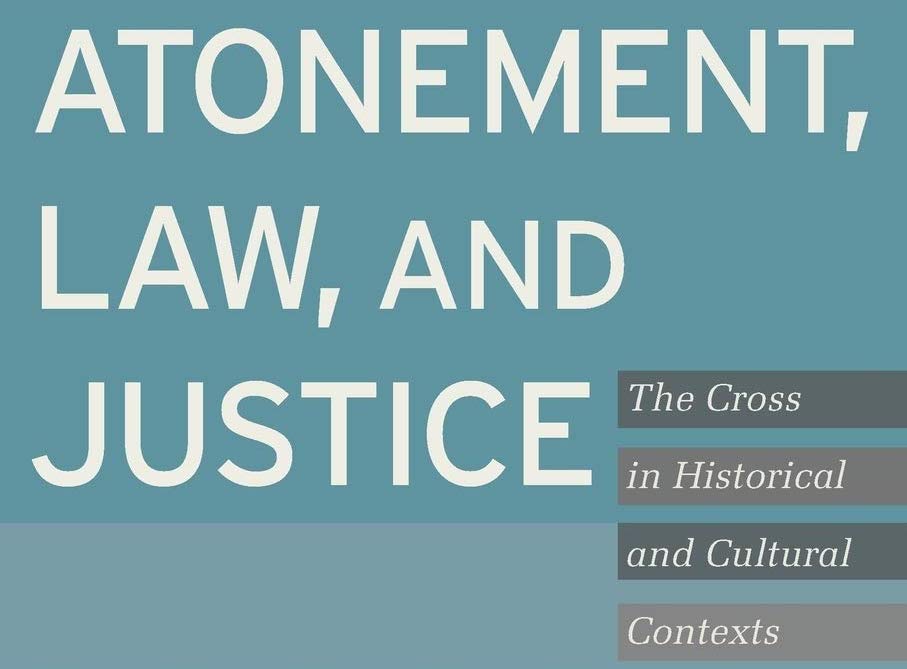Adonis Vidu, Atonement, Law and Justice: The Cross in Historical and Cultural Contexts. Grand Rapids, Michigan: Baker Academic, 2014. $24.99. Paperback. 978-0801039195
Reviewed in the Westminster Theological Journal (2016), pp.201-3.
Adonis Vidu’s Atonement, Law, and Justice is a well-researched, informative and careful study of the historical development of atonement theology in five major periods of church history: patristic, medieval, Reformation, modern, and postmodern. The study has four main conclusions. First, atonement theology was ‘deeply affected by historical developments in the arena of politics and law’. Second, there are clear links between atonement theology and ethics. Third, political justice systems are ‘deeply theological’. And finally, the various historical contentions over atonement doctrine are ultimately ‘a debate about the nature of God’ (pp.235-6). Vidu connects this history with the development of law-and-justice theories and shows how in each period theologies influenced legal philosophies and vice versa. He contends that God’s responsibility in the atonement should always be understood in the light of our knowledge of His character and that one’s atonement theology is ultimately linked to one’s doctrine of God.
In chapter one, Vidu shows how Gregory of Nyssa and Augustine criticized the pagan conception of God in relationship to the law and rejected a legalistic notion of God’s justice. Vidu argues that Augustine’s atonement theology was predominately a rehabilitative rather than narrowly retributive understanding of justice. Chapter two examines Anselm, Aquinas, Abelard and John Duns Scotus’s views, and outlines the legal revolution of the medieval age—a period when law and justice were equivalent to one another. Here, Vidu’s contention that atonement theologies were shaped by their historical culture is most convincing—especially in his analysis of how a feudal culture influenced these theologians. Vidu shows that, though Aquinas is similar to Anselm, both Peter Abelard and John Duns Scotus give priority to God’s love at the expense of God’s justice. In Chapter three Vidu illustrates how the Reformation era rejected the meritorious elements of Anselm and Aquinas’s thought. He also highlights that Luther and Calvin differed in their understandings of the law. While Luther believed God’s law was his ‘alien work’, Calvin propounded a traditional understanding of penal substitution by contending that the law was synonymous with God’s nature. Chapter four explores atonement theology through major modern thinkers like Immanuel Kant, Friedrich Schleiermacher, and Albrecht Ritschl, who rejected previous views of justice and emphasized how the atonement transforms our character. Chapter five demonstrates how post-modern thinkers either reject or further distort penal substitution and retributive justice. Post-modern thinkers also deny the law’s role in mediating justice and instead replace these theories with proposals for nonviolence. In the final chapter Vidu argues that a correct understanding of divine simplicity should guide an accurate understanding of the atonement and will annul those views that prioritize God’s love over his justice. This accurate rendering will hold that divine attributes are dissimilar to human attributes since they proceed from his nature and are not limited like ours.
The book has a number of strengths. First, Vidu seeks to ground his understanding of divine simplicity in the solid foundation of the Westminster Confession of Faith: ‘There is but one only, living, and true God, who is infinite in his being and perfection, a most pure spirit, invisible, without body, parts, or passions’ (WCF 1.2; p.247). Vidu’s arguments are strongest when they draw on the Reformed and evangelical traditions of the Christian faith and he allows history to inform his views. Another strength is the way that Vidu responds to the contemporary critiques of divine simplicity and grounds his views in a Trinitarian theology. This aids Vidu in rightly underlining that divine simplicity a qualifying attribute (that helps us understanding how God’s attributes hold together), rather than a ‘metaphysical attribute’. Finally, it is admirable how Vidu critiques John Stott’s flawed view ‘that there is a strife of attributes in the life of God’. Vidu’s critique is charitable and yet does not shy away from pointing out the grave errors of Stott’s position. His counter-position is most insightful: although at certain times it may appear that God is displaying a particular attribute more prominently than another, in these instances these attributes happen to be ‘more easily recognizable’ to us, since God actually ‘never enacts certain traits more than others’ (p.257).
While the book has a number of strengths, there are a few weaknesses. Although the book interacts well with the relevant secondary literature, at times this comes at the expense of direct engagement with primary sources themselves, when primary authors are referenced only through the secondary literature. Further, it is most troubling that Vidu is hesitant to affirm a classical expression of penal substitutionary atonement. Though he claims to be ‘in broad agreement with the penal substitutionary model’ and ‘in general sympathetic to penal substitutionary theology’, he ‘tell[s] the story of penal substitutionary’ in a way that will not satisfy many Reformed and evangelical readers in that he rejects the view that ‘penal substitution is “the one ring to rule them all”’ (pp.xiii, xviii). Finally, some readers might wish Vidu had elaborated a bit further on his doctrine of divine simplicity when he says ‘that God is not moved from wrath to mercy’ and that Christ’s atonement effects a change in the believer, not in God (p.262). It seems necessary to qualify this statement with a positive affirmation that, for those who are in Christ, God’s wrath no longer rests on them. Notwithstanding these critiques, this work will reward those scholars and students who carefully read this important contribution.




